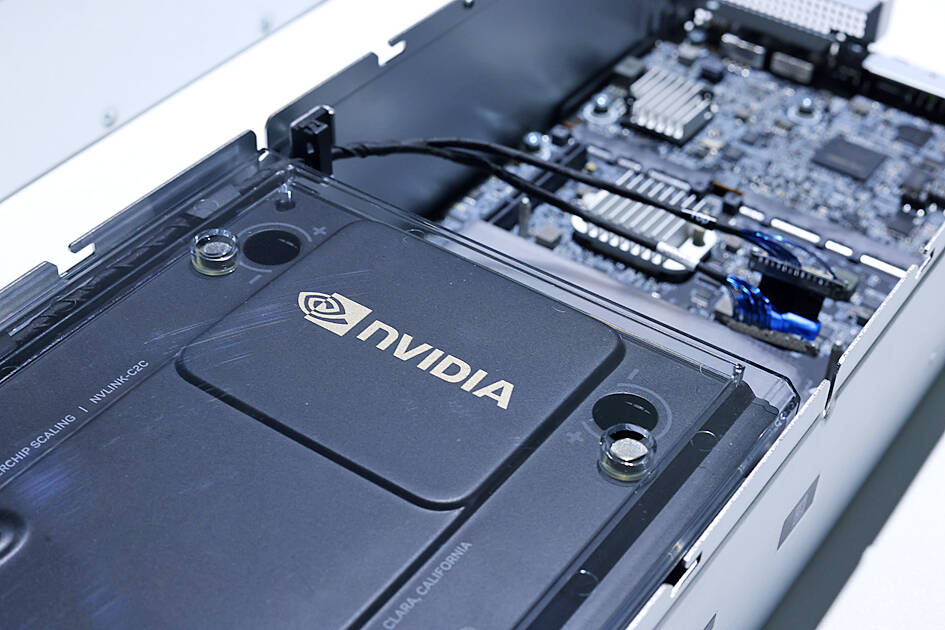Nvidia Corp is using Arm Holdings PLC technology to develop chips that would challenge Intel Corp processors in PCs, ratcheting up competition between the two semiconductor makers, people familiar with the situation said.
Nvidia, whose artificial intelligence (AI) accelerator chips already dominate that market, is attempting to make central processing units (CPUs) for PCs, said the people, who asked not to be identified because the matter is private.
The CPUs would support Microsoft Corp’s Windows operating system and go on sale as soon as 2025.

Photo: Ritchie B. Tongo, EPA-EFE
Intel’s main rival in PCs, Advanced Micro Devices Inc (AMD), is also working on Arm-based processors, according to the people. AMD currently licenses Intel’s technology.
It is not the first attempt to use Arm technology — common on smartphones — to crack the PC processor industry. A number of companies have made a run at traditional PC processors over the years with little impact.
Windows RT, which Microsoft announced in 2011 at CES, formerly known as the Consumer Electronics Show, was designed to run on Arm designs. The first of Microsoft’s Surface devices was based on that operating system and used an Nvidia Tegra chip, but the those early models did not catch on with consumers.
Apple Inc has provided a more recent model for how to replace Intel technology. The company switched from using Intel processors in its Mac computers with in-house designs that are based on Arm’s standards. It has credited the change with boosting Mac sales.
Qualcomm Inc, the biggest maker of phone chips, is the only other maker of Arm-based chips for Windows-based PCs.
Representatives of AMD, Arm and Nvidia declined to comment.

UNCERTAINTY: Innolux activated a stringent supply chain management mechanism, as it did during the COVID-19 pandemic, to ensure optimal inventory levels for customers Flat-panel display makers AUO Corp (友達) and Innolux Corp (群創) yesterday said that about 12 to 20 percent of their display business is at risk of potential US tariffs and that they would relocate production or shipment destinations to mitigate the levies’ effects. US tariffs would have a direct impact of US$200 million on AUO’s revenue, company chairman Paul Peng (彭雙浪) told reporters on the sidelines of the Touch Taiwan trade show in Taipei yesterday. That would make up about 12 percent of the company’s overall revenue. To cope with the tariff uncertainty, AUO plans to allocate its production to manufacturing facilities in

Taiwan will prioritize the development of silicon photonics by taking advantage of its strength in the semiconductor industry to build another shield to protect the local economy, National Development Council (NDC) Minister Paul Liu (劉鏡清) said yesterday. Speaking at a meeting of the legislature’s Economics Committee, Liu said Taiwan already has the artificial intelligence (AI) industry as a shield, after the semiconductor industry, to safeguard the country, and is looking at new unique fields to build more economic shields. While Taiwan will further strengthen its existing shields, over the longer term, the country is determined to focus on such potential segments as

TAKING STOCK: A Taiwanese cookware firm in Vietnam urged customers to assess inventory or place orders early so shipments can reach the US while tariffs are paused Taiwanese businesses in Vietnam are exploring alternatives after the White House imposed a 46 percent import duty on Vietnamese goods, following US President Donald Trump’s announcement of “reciprocal” tariffs on the US’ trading partners. Lo Shih-liang (羅世良), chairman of Brico Industry Co (裕茂工業), a Taiwanese company that manufactures cast iron cookware and stove components in Vietnam, said that more than 40 percent of his business was tied to the US market, describing the constant US policy shifts as an emotional roller coaster. “I work during the day and stay up all night watching the news. I’ve been following US news until 3am

COLLABORATION: Given Taiwan’s key position in global supply chains, the US firm is discussing strategies with local partners and clients to deal with global uncertainties Advanced Micro Devices Inc (AMD) yesterday said it is meeting with local ecosystem partners, including Taiwan Semiconductor Manufacturing Co (TSMC, 台積電), to discuss strategies, including long-term manufacturing, to navigate uncertainties such as US tariffs, as Taiwan occupies an important position in global supply chains. AMD chief executive officer Lisa Su (蘇姿丰) told reporters that Taiwan is an important part of the chip designer’s ecosystem and she is discussing with partners and customers in Taiwan to forge strong collaborations on different areas during this critical period. AMD has just become the first artificial-intelligence (AI) server chip customer of TSMC to utilize its advanced